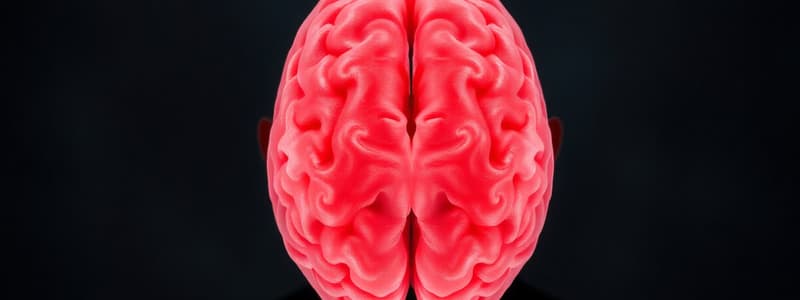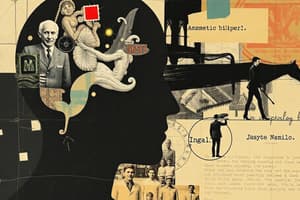Podcast
Questions and Answers
What is anterograde amnesia?
What is anterograde amnesia?
- Inability to retrieve old memories
- Inability to recall recent events
- Inability to remember anything
- Inability to form new memories (correct)
Patient H.M. had severe retrograde amnesia.
Patient H.M. had severe retrograde amnesia.
False (B)
Which type of amnesia did Clive Wearing experience?
Which type of amnesia did Clive Wearing experience?
- Retrograde only
- None
- Anterograde only
- Near-total anterograde and retrograde (correct)
What is the definition of priming in memory?
What is the definition of priming in memory?
According to Craik & Lockheart, _____ processing involves attention to meaning.
According to Craik & Lockheart, _____ processing involves attention to meaning.
Which of the following is a method for remembering sequences of items?
Which of the following is a method for remembering sequences of items?
Retrieval of memories is a simple reproduction of past events.
Retrieval of memories is a simple reproduction of past events.
What type of memory is primarily used for the Tower of Hanoi puzzle?
What type of memory is primarily used for the Tower of Hanoi puzzle?
Match the types of memory with their definitions:
Match the types of memory with their definitions:
Flashcards are hidden until you start studying
Study Notes
Long Term Memory Impairment
- Amnesia is a type of long-term memory impairment.
- There are two types of amnesia: anterograde amnesia (inability to form new memories) and retrograde amnesia (inability to retrieve old memories)
- Retrograde amnesia is the inability to remember the past.
- Anterograde amnesia is the inability to create new memories.
- Patient H.M. had surgery to remove the hippocampus and medial temporal lobes.
- H.M. had severe anterograde amnesia but very little retrograde amnesia.
- Clive Wearing suffered near-total anterograde and retrograde amnesia.
- Hippocampal damage can lead to anterograde amnesia.
Multiple Long Term Memory Systems
- There are two main categories of long-term memory: implicit and explicit (declarative) memory.
- Explicit memory includes episodic and semantic memory.
- Episodic memory is our memory of personal life experiences.
- Semantic memory is our memory for facts and information.
- Implicit memory includes procedural memory, classical conditioning, and priming.
- Procedural memory is our memory of skills or habits.
- Classical conditioning is a type of learning where a neutral stimulus comes to evoke a response.
- Priming is a type of implicit memory that occurs when exposure to a stimulus influences responses to a later stimulus.
Mirror Drawing Task
- Amnesics improve normally at mirror drawing with practice but do not explicitly remember having done the task.
- Amnesics show impaired declarative memory for having done the task, but their non-declarative memory for the learned skill is normal.
Tower of Hanoi Task
- Amnesics improve normally at the Tower of Hanoi task with practice but do not explicitly remember having done the task.
- Amnesics show impaired declarative memory for having done the task, but their non-declarative memory for the learned skill is normal.
Word Puzzles
- Priming is a type of implicit memory that occurs when exposure to a stimulus influences responses to a later stimulus.
Encoding: Depth of Processing
- Shallow processing is attention to surface features (sound, appearance).
- Deep processing is attention to meaning.
- Deeper processing leads to better memory storage.
Encoding: Imagery
- The method of loci is a memory technique that imagines encountering items in well-known locations to improve recollection.
Retrieval: Encoding Specificity
- Memory is better when conditions at retrieval match conditions at study.
- Context-dependent memory is the theory that memory is better when conditions at retrieval match the environmental context at encoding.
- State-dependent memory is the theory that memory is better when conditions at retrieval match the internal state at encoding.
Retrieval: Reconstruction
- Memories are reconstructions of events, not simple reproductions.
- Leading questions can make memory reconstruction inaccurate.
- Memory reconstruction is influenced by suggestions and prior knowledge.
False Memories
- False memories are extremely common and normal.
- The misinformation effect can cause inaccurate information to be added to a memory through suggestions.
- Source monitoring confusion occurs when we lose track of where a memory came from.
- Cryptomnesia is a type of source monitoring confusion where we incorrectly attribute memories to our own experiences.
- Imagination inflation is a type of source monitoring confusion where we falsely believe that we have experienced something simply by imagining it.
- The false fame effect is a type of source monitoring confusion where we incorrectly believe that someone is famous simply because we have heard their name.
- Memory retrieval is more like reconstruction than reproduction.
Studying That Suits You
Use AI to generate personalized quizzes and flashcards to suit your learning preferences.




